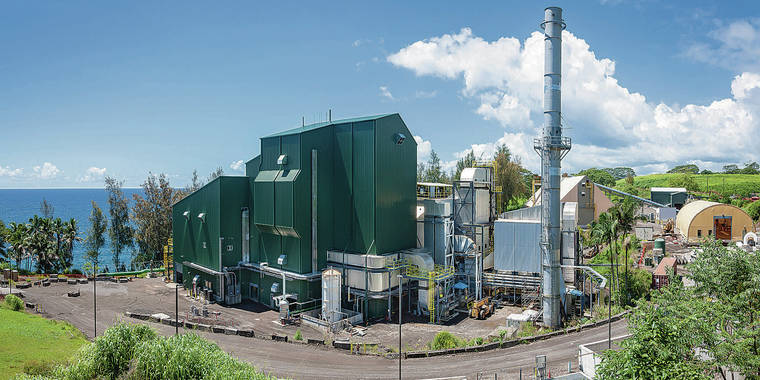Four former Hawaii governors have thrown their support behind the controversial Honua Ola Bioenergy project, whose fate is under appeal before the state Supreme Court.
George Ariyoshi (1974-1986), John Waihe‘e (1986-1994), Ben Cayetano (1994-2002) and Neil Abercrombie (2010-2014) issued a joint statement Thursday urging that the biomass plant be allowed to go forward and begin producing clean renewable energy for Hawaii.
“We believe Honua Ola Bioenergy, the green energy plant in Pepe‘ekeo designed and built following government approvals to produce renewable energy for decades to come, will reduce the state’s dependence on fossil fuels, help Hawai‘i to combat climate change, and provide vitally needed jobs to support the economic recovery of the Big Island,” the governors said in the statement.
Hu Honua Bioenergy LLC, which does business as Honua Ola Bioenergy, has been seeking the Public Utility Commission’s approval to begin operating a $474 million biomass plant on the Hamakua Coast that is 99% complete and will burn trees to produce energy. That energy would be purchased by Hawaii Electric Light Co. under an agreement between the two companies.
But the project was
rejected twice in the past three months by the PUC
after the state agency previously approved the facility. Hu Honua filed a petition last month with the Supreme Court requesting
that the PUC be ordered to vacate its latest decision.
A legal challenge in 2017 by the environmental group Life of the Land took the project before the state Supreme Court initially. The court ordered the PUC in 2019 to reconsider its original approval because the agency failed to “explicitly consider” the state’s goal of reducing greenhouse gases, which is required under state law. The PUC then rejected the biomass plant, citing that long-term impacts of a 30-year contract would make the energy more expensive than other renewable-energy sources and that the public interest would be best served by requiring the project to be evaluated alongside other renewable-energy proposals.
A second PUC rejection came last month after Hu Honua filed a motion asking the state agency to reconsider its decision.
Henry Curtis, executive director of Life of the Land, said he opposes the Hu Honua project because “one, it will increase global greenhouse gas emissions, and, two, it will raise rates for Big Island customers.”
The governors said they appreciate “Honua Ola’s dedication to plant and grow more trees than will be harvested from commercial forests of eucalyptus trees planted on former sugar lands, and their pledge that the project will be carbon negative. … We applaud the fact that Honua Ola will plant more than 3 million trees through the National Forest Foundation during its first five years and that it will also support a significant tree-planting project with the Friends of Hawai‘i Volcanoes National Park.”
Curtis said Hu Honua is not being honest about its intention to plant trees.
“Hu Honua is not going to plant a single tree,” he said. “Their owner, Jennifer Johnson, who is the primary owner of Hu Honua, has stated that she has some kind of arrangement (with a third party to plant trees) that is not part of the PUC docket. Hu Honua argued in the docket that all chopping down trees and planting trees should not be part of the proceeding.”
Curtis said Life of the Land sought to put the entire agricultural issue into the PUC docket and that “Hu Honua fought us tooth and nail and said chopping down trees and planting trees is not part of the proceeding. Now they’re using the media to say they’re doing this great forestry work.”
Abercrombie, in a separate statement, said when Honua Ola goes into operation, it will enable Hawaiian Electric to begin retiring its fossil fuel plants on the Big Island. The governors said the biomass plant will produce 15% of the Big Island’s electricity needs while eliminating the need for an estimated 250,000 barrels of imported oil each year.
“As a result of Honua Ola replacing fossil fuel plants and growing new trees, the amount of greenhouse gas emissions will be reduced, along with other pollutants released by the fossil fuel facilities,” Abercrombie said.
Honua Ola has said it will provide more than 200 jobs in plant operations, forestry, transportation and other industries.
“These will be good-paying jobs going to local residents who will spend their earnings on the Big Island and pay taxes to support state and county government initiatives,” Abercrombie said.

